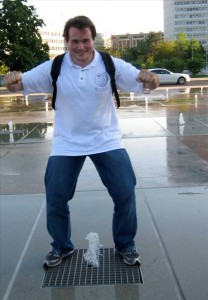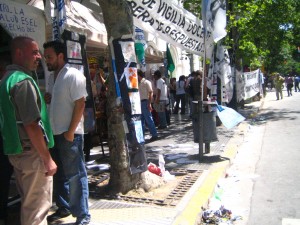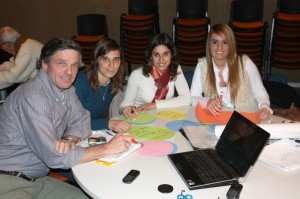The digital divide in education
Before I talk about paths other family members in my generation took in the German educational system, I want to come back to what my cousin Thorsten said in his interview: “The future of education is in Web.2.0.”
Many of the other bloggers and I have already written about this: No matter whether in Kenya or in Germany, technology opens new doors to education everywhere. But these don’t overcome old problems.
![]() read more
read more
Empower the student to learn
At the beginning of the week I was talking to my coworker Patricia about how education is approached in our country. She coordinates a regional program aiming to strengthen technical education in different fields, like math, science, industry-applied technology and school management. The program’s various groups in different regions of the country do not work directly with students; they work with teachers and school principals. The aim is to train educators and hence improve technical education by setting higher standards.
![]() read more
read more
A notice to our readers
Our blogger from Iraq, Hellgurd, has received severe threats in response to his blog entries.
In an effort to protect the author’s safety, DW has decided not to publish further posts from him in this blog.
“The future of education is in Web 2.0”
My family members have taken different paths through the German educational system. To offer you more insight, I interviewed my cousins and my brother. In my first interview, I’m speaking to my cousin Thorsten, 26, who went to school in Germany and Canada. He thinks schools should offer a broad-based education to further society’s cohesion.
![]() read more
read more
“Education here kills creativity”
I had a busy weekend recently. The organization that I coordinate – Filamujuani – was shooting the second episode of a TV show called Zuki. It was amazing, though, to see the students of Filamjuani finally coming of age, taking the reins and running the show completely.
The TV series is about a schoolgirl born in Kibera whose passion is music, but unfortunately, she has no avenues to learn it. She has a talent that even she doesn’t understand.
![]() read more
read more
Reflecting on the value of a degree
Emmy’s entry caught my attention because she talked about something I’ve faced myself – a lack of teachers combined with too many pupils in a class. It usually results in the following: Those who understand and are eager to learn do so, while those who have no intention to learn either sit quietly throughout the term or become obstacles to the teacher. Generally, these types of pupils just aim at getting a “satisfactory” mark. As one of my teachers used to say, it’s a mark that shows nothing – neither your skills in a particular sphere, nor your interests. But still, it’s over the level needed to pass an exam, so you are considered an educated person! There’s a danger when students graduate with most marks just at the satisfactory level. They are de jure qualified enough to work in the area they studied. But, de facto, they are almost incompetent. In reality, they seldom pursue a career in what they studied.
![]() read more
read more
Teachers: taking action at the root
In March this year, there was a huge strike from the teachers’ union in which they demanded a salary raise. Every year, the timing works out almost identically: the academic year in Argentina starts in March, and some three weeks to a month before that, negotiations with the union take place. There was the threat that classes would not actually start because no agreement had been reached. Teachers in Argentina have some of the lowest wages in society, so it’s very common that they have to overwork themselves to make a decent living.
![]() read more
read more
Financing university studies in Germany
In my last entry, I wrote about my motivation for founding the local chapter of ArbeiterKind.de in Mainz. Today I want to share some of the experiences I have had through my activities for this organization as well as those of my friends.
One statement comes immediately to mind for me:
“I didn’t tell them that I was receiving BaföG [educational loans and grants available from the state in Germany]. And I felt so terrible as they were criticizing ‘all of those cheaters who would steal money from the state’.”
![]() read more
read more
“We shouldn’t seek some land of dreams abroad”
The closer my graduation comes, the more I’ve been thinking about education in my country. And mostly Im worried. During the 3.5 years I’ve spent at my second university, I’ve talked with dozens of students about their views of the future, and I’ve heard their opinions about the situation today. I did the same at my former university, and I would say it’s like this: Many students who study in big cities and well-known universities (at least in Russia) are aiming to apply for positions in international companies so that they “get out of the country.” Just a few of them added “… and come back after having gained some experience there.”
![]() read more
read more
Innovative approaches to community activism
Apart from my work at the NGO, I have time to freelance as a journalist from time to time. Last week I interviewed Silvio, the director of Los Grobo Foundation. We talked about the role of NGOs in society, the different actors in a community and how to present them to benefit social development. I thought it was worth sharing some of his ideas here!
![]() read more
read more

















Feedback